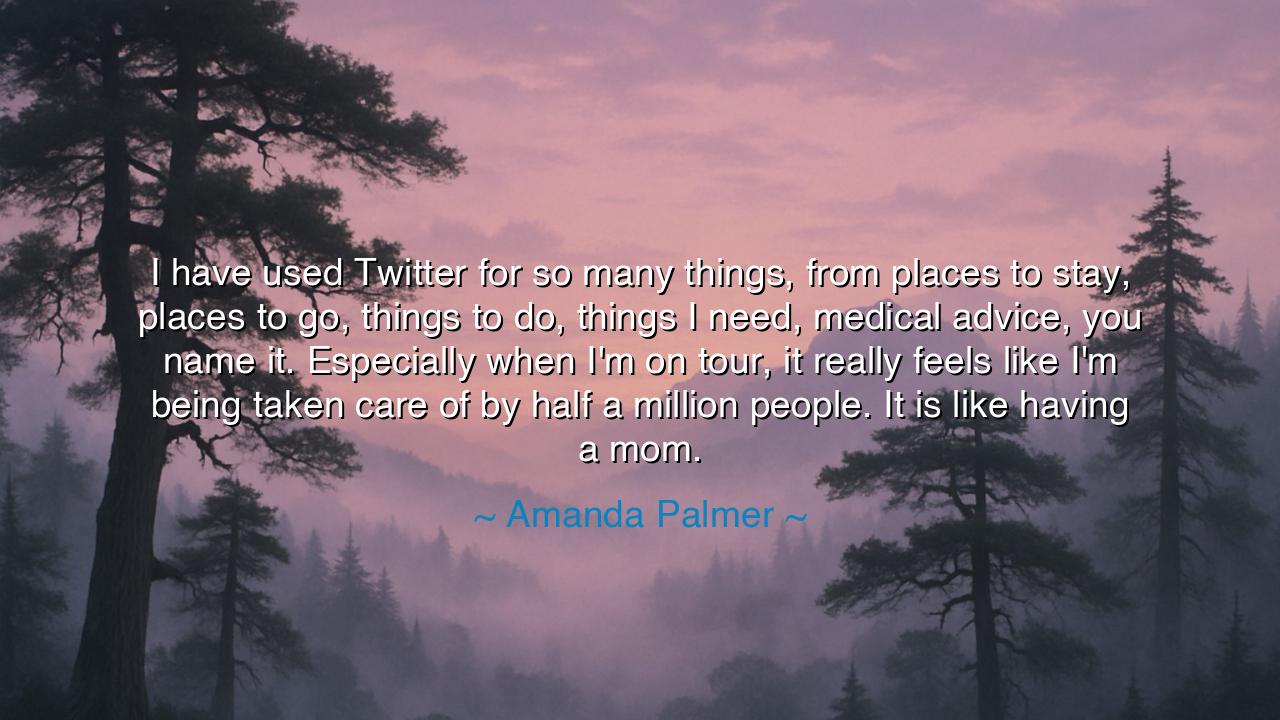
I have used Twitter for so many things, from places to stay
I have used Twitter for so many things, from places to stay, places to go, things to do, things I need, medical advice, you name it. Especially when I'm on tour, it really feels like I'm being taken care of by half a million people. It is like having a mom.






The words of Amanda Palmer—“I have used Twitter for so many things, from places to stay, places to go, things to do, things I need, medical advice, you name it. Especially when I’m on tour, it really feels like I’m being taken care of by half a million people. It is like having a mom.”—speak with the voice of one who has discovered the strange intimacy of the modern age: a bond with multitudes, formed not by blood, but by connection. In these words we hear wonder, gratitude, and awe—that through a simple platform of communication, an artist wandering far from home may feel embraced, supported, and sheltered, as though by a vast and unseen family.
At its heart, Palmer’s reflection is about community. Though she travels alone, she is not alone. The network of her listeners, her followers, and her friends online becomes a tapestry of care. What in ages past might have required the charity of a village or the protection of kin is now offered by strangers who share only music, story, or spirit in common. She likens this support to the tenderness of a mother, for the mother is the first and most steadfast caretaker, the one who feeds, guides, and comforts. To feel such care flowing from many voices across the digital world is to feel that humanity itself has become maternal.
The ancients, too, knew the power of crowds to sustain. When Odysseus wandered, he relied on the generosity of strangers to find his way home, each harbor and hearth a gift of survival. When early Christians traveled, they were sustained by the hospitality of those who had never met them, yet considered them kin. So too, Palmer finds that the generosity of many hands lifts her from weariness on the road, giving her food, shelter, and guidance. Though the tool is modern—Twitter—the spirit is ancient: the human impulse to care for one another in times of need.
Yet her words also carry a heroic strangeness. For she admits she even seeks medical advice from this chorus of voices. Here is the paradox of the modern world: wisdom once sought from the healer in the village square is now gathered from thousands in the digital square. There is risk here, for not every voice carries truth. But there is also power, for when the many speak with sincerity, knowledge is shared freely, often with astonishing precision. It is the ancient agora reborn, where the wisdom of the crowd may sometimes guide more swiftly than the slow march of institutions.
The emotional strength of Palmer’s words lies in her vulnerability. To confess that one depends on others is no weakness, but humility. It is an acknowledgment that no artist, no wanderer, no human stands alone. Even the strongest warrior must lean on the shield-wall, even the most gifted singer must be sustained by those who listen. In comparing her network to a mother, she is not ashamed, but grateful—grateful to be cared for, grateful to be lifted when the road grows long.
The lesson for us is clear: do not despise the bonds of community, even when they come from unexpected places. Whether from family, from neighbors, or from the voices of strangers across the world, accept the care that is given, and give care in return. Practically, this means offering what you know when others ask, extending kindness to those who wander, and remembering that in a world that often feels fragmented, even small acts of generosity can create the feeling of a mother’s embrace.
Thus, Amanda Palmer’s words shine as both testament and teaching: technology, when infused with humanity, becomes not cold machinery, but a vessel of care. Let us remember that behind every message is a soul, and behind every crowd, the possibility of community. And let us pass on this truth to future generations: that strength lies not only in independence, but in interdependence—in the willingness to let ourselves be cared for, and in the courage to care for others.






AAdministratorAdministrator
Welcome, honored guests. Please leave a comment, we will respond soon